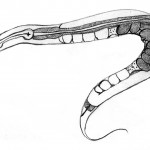 Scientists at the Salk Institute in La Jolla, California reported in the journal Nature that they have discovered the existence of a genetic pathway in roundworms (Caenorhabditis elegans) that appears to extend their lives when their caloric intake has been reduced. This finding may have implications for human longevity. It’s been known for some time that reducing the intake of calories extends the lives of human beings and other living creatures. However, this is the first time that a specific genetic mechanism has been discovered that appears to be set off by a reduced-calorie diet.
Scientists at the Salk Institute in La Jolla, California reported in the journal Nature that they have discovered the existence of a genetic pathway in roundworms (Caenorhabditis elegans) that appears to extend their lives when their caloric intake has been reduced. This finding may have implications for human longevity. It’s been known for some time that reducing the intake of calories extends the lives of human beings and other living creatures. However, this is the first time that a specific genetic mechanism has been discovered that appears to be set off by a reduced-calorie diet.
Now that this link has been revealed, it may be possible to regulate this genetic pathway through drugs rather than a reduced calorie diet (a regimen that is difficult for many humans to follow). Such a discovery may result in a significant extension of life for human beings. While the specific gene was discovered in roundworms, scientists have discovered exact counterparts for this gene in mammals: three genes that have been labeled FoxA 1, 2, and 3.
These genes belong to a large family of master regulator genes that control other genes. While today’s finding is significant for the possibility of extending lifespan in human beings, much research remains to be done to further define these genetic pathways and to develop drugs that do not have harmful side effects for human beings. To read a report on these findings in The New York Times, click here.
For more information on issues related to aging and late adulthood, see my book: The Human Odyssey: Navigating the Twelve Stages of Life
This article was brought to you by Thomas Armstrong, Ph.D. and www.institute4learning.com.
Follow me on Twitter: @Dr_Armstrong



















